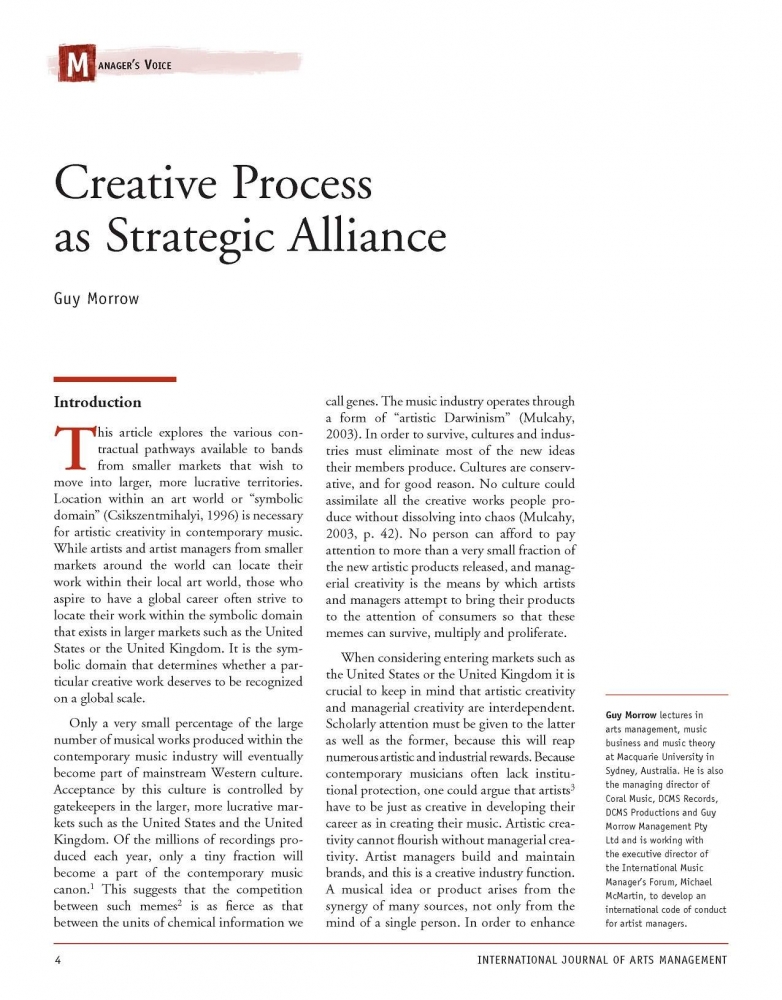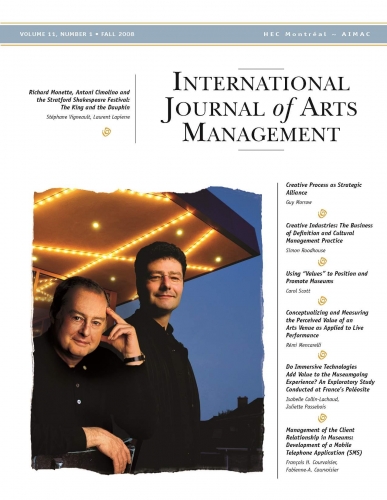Creative Process as Strategic Alliance
Product: Article
$21.00 CA
Guy Morrow
Guy Morrow lectures in arts management, music business and music theory at Macquarie University in Sydney, Australia. He is also the managing director of Coral Music, DCMS Records, DCMS Productions and Guy Morrow Management Pty Ltd and is working with the executive director of the International Music Manager’s Forum, Michael McMartin, to develop an international code of conduct for artist managers.
ABSTRACT
The author explores the various contractual pathways available to bands in smaller markets that wish to move into larger, more lucrative territories. In the absence of a definitive method that artist managers from smaller markets can use to achieve success in foreign territories, the author discusses three methods for releasing recordings in the United States or the United Kingdom: (1) signing directly with an American or British independent or major label, (2) sourcing a deal with a multinational out of a smaller market and having it released in the United States or the United Kingdom through an inter-company licence agreement, or (3) licensing or assigning the right to exploit the copyright on a pre-existing record to a label in the United States or the United Kingdom. Instead of being disillusioned because there is “no answer,” artists and artist managers in smaller markets should feel optimistic because there are multiple answers.
KEYWORDS
International artist management practices, popular music
RÉSUMÉ
L’auteur explore les diverses voies contractuelles qui s’offrent aux groupes musicaux des petits marchés désireux d’entrer dans un grand marché étranger et plus lucratif. En l’absence d’une méthode managériale définitive permettant aux artistes de réussir ce passage, l’auteur propose trois méthodes de lancement d’enregistrements aux États-Unis ou au Royaume-Uni. Les artistes ou leurs agents pourraient 1) signer directement avec une étiquette américaine ou britannique indépendante ou majeure; 2) conclure une entente avec une multinationale à l’extérieur de leur marché d’origine pour que le lancement ait lieu aux États-Unis ou au Royaume-Uni par le biais d’un accord intersociétés sur la licence; 3) accorder à une étiquette américaine ou britannique une autorisation ou une cession de licence pour l’exploitation des droits d’auteur pour un enregistrement préexistant. Au lieu d’être désillusionnés parce qu’il n’y a « pas de solution », les artistes dans les petits marchés et leurs agents devraient faire preuve d’optimisme parce qu’il existe au contraire de multiples solutions.
MOTS CLÉS
Pratiques de gestion d’une carrière artistique internationale, musique populaire
RESUMEN
El autor explora las distintas opciones contractuales que se ofrecen a los grupos musicales que obran en mercados pequeños y quieren tener acceso a espacios más amplios y lucrativos. A falta de métodos definitivos de los puedan disponer los empresarios artísticos de dichos mercados para ser exitosos en el extranjero, el autor analiza tres métodos para lanzar grabaciones en Estados Unidos o el Reino Unido: (1) firmar directamente con una marca estadounidense o británica importante o independiente, (2) determinar un arreglo con una multinacional en un mercado pequeño para que el lanzamiento se haga en Estados Unidos o en el Reino Unido mediante un contrato de licencia entre compañías, (3) obtener una concesión de licencia o ceder los derechos para explotar el derecho de autor de una grabación ya existente a una marca en Estados Unidos o en el Reino Unido. En lugar de perder las ilusiones porque “no hay respuesta”, los artistas y empresarios en los mercados pequeños deberían alegrarse de que existen respuestas múltiples.
PALABRAS CLAVE
Prácticas de gestión artística internacional, música popular

